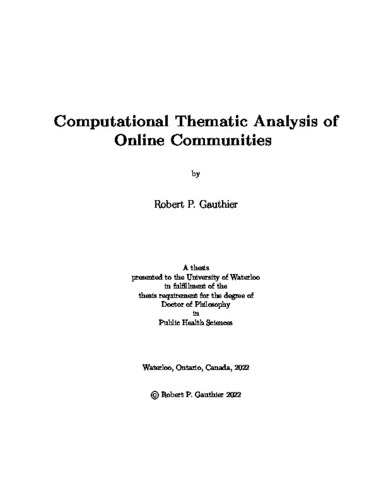| dc.description.abstract | Public health researchers can use thematic analysis to develop human understandings of health topics from the lived experiences discussed in online communities. However, thematic analyses of online communities are difficult to conduct because large data sets amplify the resource intensity and complexity of the common phases: Data Collection, Data Familiarization, Coding, and Theme Review. Researchers can manage this amplification by integrating computational techniques that facilitate scalable interaction with large data sets when they converge with tasks completed during a thematic analysis.
My thesis’ research explored barriers to integrating computational techniques into thematic analysis through three research questions: RQ1. Could computational techniques be used within a thematic analysis to assist with the analysis of online communities’ data? RQ2. How might tools be developed to not require programming expertise when integrating computational techniques as part of thematic analysis tasks? RQ3. How does a computational thematic analysis that integrates computational techniques compare with a traditional manual thematic analysis? To address these questions, I used a three-staged approach where I first piloted integrating techniques in a thematic analysis of addiction
recovery. I then designed artifacts based on my pilot experience that allow qualitative researchers without programming expertise to integrate techniques. Finally, I deployed my artifacts with public health researchers to explore integration’s impact on their real-world thematic analyses.
During my Pilot Stage, I conducted a topic-guided thematic analysis of two Reddit addiction recovery communities. Performing this analysis contributed a demonstration of integrating Latent Dirichlet Allocation topic modelling, a computational technique, to guide my reflexive thematic analysis by sampling interesting places in online discussion data sets for coding. Additionally, I discussed how integration benefited my data familiarization by facilitating the identification of patterns while being limited due to balancing metric optimization with interpretive usefulness when creating topic models.
In my Design Stage, I created my Computational Thematic Analysis Workflow and Computational Thematic Analysis Toolkit to build upon my pilot stage experiences and support qualitative researchers. My workflow provides researchers with guidance on planning a reflexive thematic analysis of online communities that integrates computational techniques. Similarly, my toolkit supports qualitative researchers by implementing computational techniques as reusable tools in a graphic user interface that integrates into thematic analyses without requiring programmer expertise.
My Deploy Stage investigated the impact of integrating computational techniques by collaborating with public health researchers studying COVID-19 news article comments.The researchers independently performed two inductive thematic analyses, one of which used my Computational Thematic Analysis Toolkit. I then work with the researchers to compare their processes and results. From this comparison, I identified that integrating computational techniques to facilitate multiple data interactions aided the analysis by enabling different interpretations. Additionally, despite both analyses developing a convergent set of themes, computational technique integration had subtle influences leading to divergent analysis processes and coding approaches.
The contributions from my three stages have collective implications for qualitative research, human-computer interaction, and public health. My work provides qualitative researchers with demonstrations and tools that support integrating computational techniques to research online communities. My research created a base workflow and toolkit that human-computer interaction practitioners can support and extend to facilitate the integration of computational techniques into qualitative methods. Additionally, I addressed calls in human-computer interaction research to include qualitative perspectives in work that impacts qualitative researchers. Finally, public health researchers can use my guidance and toolkit to manage the amplification of resource intensity and complexity to perform thematic analyses on the lived experiences discussed in online communities. As researchers identify online communities’ perspectives on new and existing health issues, they can de-
velop health interventions that impact people represented by online communities. | en |

